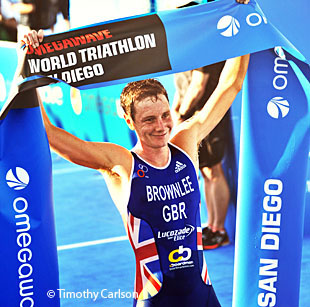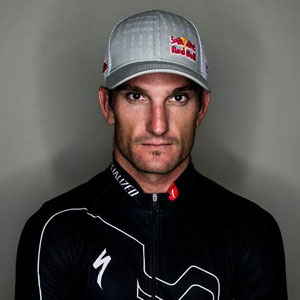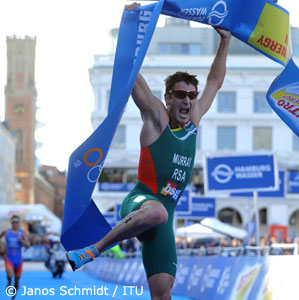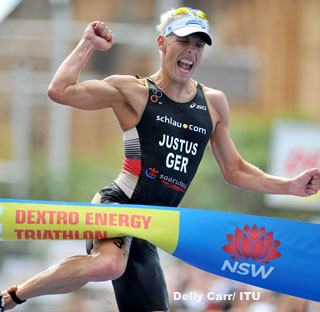Maui rookie with a good shot
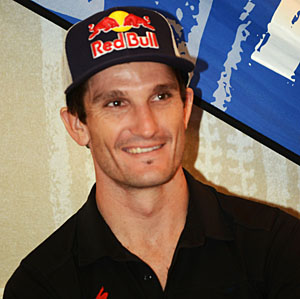
South African Richard Murray hopes to walk in the footsteps of Javier Gomez as this year's ITU Olympian to win the XTERRA World championship in Maui in his first attempt. Murray, who is nowhere near Gomez's sterling career record which includes 3 ITU World Championship titles and an Olympic silver medal (Murray was 17th in the 2012 Olympics and was 5th in the WTS rankings this year) still has some key factors in his favor which give the South African some hope: First, at 24 he is six years younger than Gomez. Two, on two occasions he outsprinted Gomez to win prestigious ITU sprint races. And three, Murray grew up a motocrosser and a mountain biker, whereas the Spaniard pretty much started his mountain bike history a few weeks before last year's XTERRA World championship in Maui.
Such comparisons may be comforting to the third year ITU World Triathlon Series veteran but they do not directly apply as Gomez will not be defending his crown in Maui. Murray instead must face a daunting crew of XTERRA stars and ITU crossover talent in order to ascend the throne. But hope still lives as Murray does have the experience of beating 4-time XTERRA World Champion and fellow South African Conrad Stoltz at XTERRA South Africa this February in his only previous XTERRA race.
Murray was interviewed one-on-one at the Ritz-Carlton in Kapalua, Maui supplemented by a few answers at the XTERRA pro press conference.
Slowtwitch: What has surprised you about the lead up to XTERRA World Championship?
Richard Murray The Stockholm World Triathlon Series race was the first time I was invited to the press conference and I got the times mixed up and missed it completely. But I've had more media requests here than anywhere at the ITU races. This has me completely mixed up.
ST: Why do you suppose South Africa – with Conrad Stoltz, Dan Hugo and yourself making up three of six men in the pre race conference – stands so high in the world of XTERRA?
Richard: The biggest reason is we all come from a farming background. It is very strength orientated. You throw bales and you work with trucks and you ride motorcycles and I think all of these things help the mentality that you need for XTERRA — because it is tough and it's hard.
ST: XTERRA is where you ride over rocks and slippery steep mountain trails that jolt and jostle even the steeliest veterans to the edge of disaster.
Richard: You have problems and things break and you must fix them and all those qualities from farming probably helps a lot..
ST: What was your life on the farm and your athletic pursuits there like?
Richard: The first 18 years of my life I lived on a grain farm just outside of Durbanville called Philadelphia. When I was quite young I started a little mountain biking and I ran every day on a gravel road with the dogs. That was how it all started for me. I was still running barefoot in those days — I didn’t have shoes.
ST: Made for nice tough feet eh?
Richard: Yeah I have to wear shoes now. I wish we didn't have to race with shoes, because I wouldn't. Heh heh. I shouldn't say that. I race with Pumas. They make a shoe which is better for my feet. I've tried a lot of shoe companies but Pumas work the best for me.
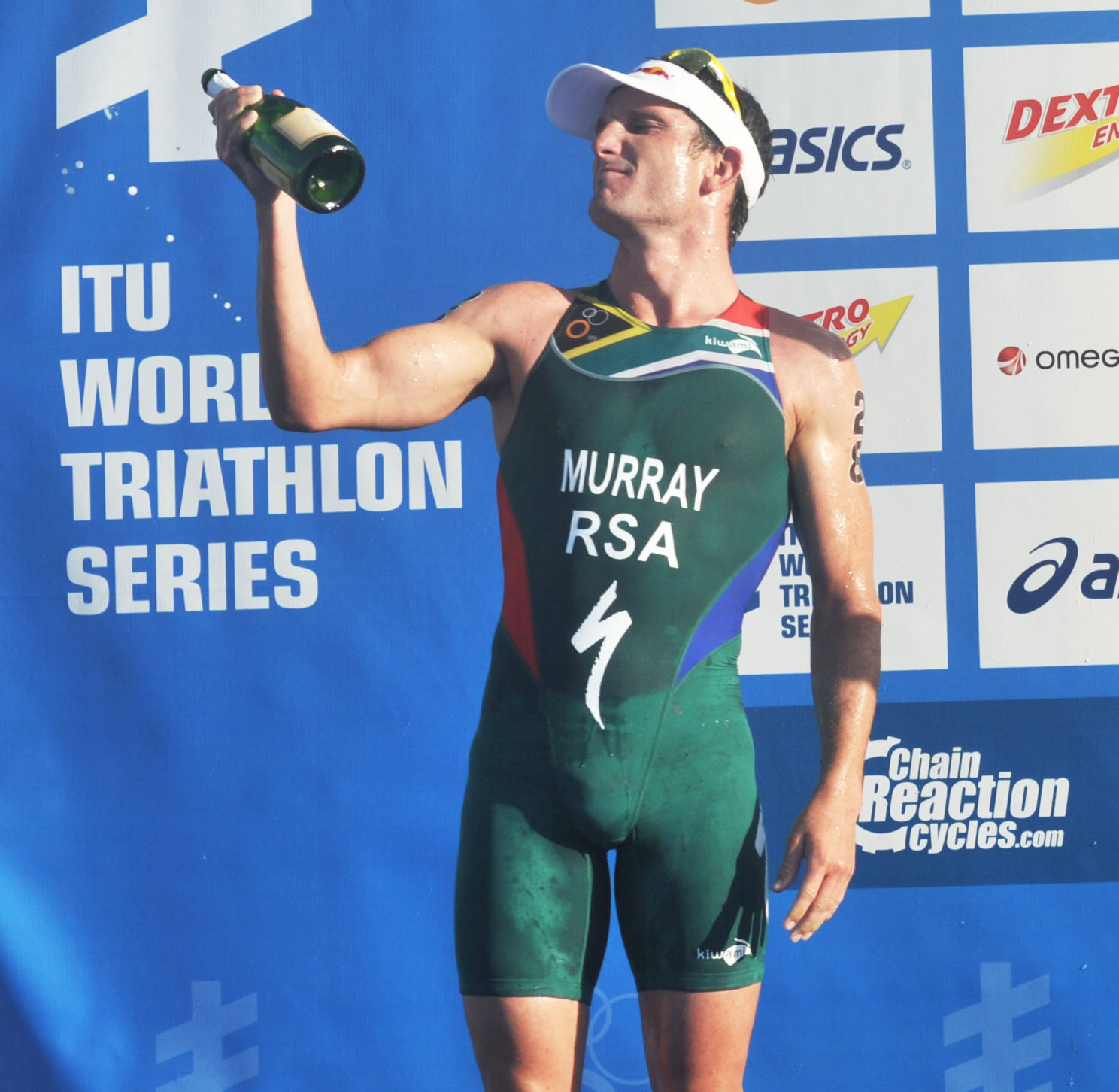
Richard: How far along are you now with the mountain biking? You have seen Conrad at his best for a few moments where you were trailing him closely at XTERRA South Africa.
ST: I am very confident with my bike handling skills. And my strength to weight ratio at the moment now is quite good. It shows on the road. If you can bike 45 kilometers for one hour that is quite good in time trialing. And that helps you on the mountain bike. The technical side is the big one. Because if your technical side is bad you use a lot of energy just trying to ride the bike. And so luckily I put the technical side to it as well.
ST: ITU racing is vicious, cut and thrust in large packs on the bike and full out in the run. What is the most striking difference between XTERRA and ITU racing?
Richard: I think in XTERRA you are racing yourself. Especially on this course. If you are trying to race someone else most likely both of you will lose because you end up racing each other and you are not focusing on what you should be doing. It's like an Ironman. If you follow someone else in Ironman, it's a bad idea. I haven't raced Ironman, but I have seen people do it and seen a lot of people blow up. Ironman and XTERRAS are about controlling your inner tiger.
ST: With all that strength work, and lifting bales and how did you get so bloody fast running on pavement?
Richard: My father was a track athlete and my mother was netball player – professional almost. My father is Neville Murray — and he is also a very strong man with a lot of endurance. He rode the Paris-Dakar rally on a motorcycle. He was one of the few South Africans to do it – and he was 50 years old when he did it as well. He also ran a sub 4 minute mile when he was a kid. I am not sure the date, but I think in the '60s or the '70s he ran a sub-4 minute mile which was one of the fastest in the world at that time. Then he had a motorcycle accident so he hasn't been able to run since then. So I've got my genes from my father and developed my talent coming from the farm and doing those things and I running every day. I wasn't being forced to, I just I did it and loved it.
ST: You loved the sheer feeling of running?
Richard: Of just being outside.
ST: What were those runs like?
Richard:The best thing was when I went out for a run my dog, a Border Collie named Richie, would just follow me. We ran down the gravel road every day. Richie came to our house from someone who went to climb Everest. They gave us their dog and something happened on the mountain and that person never returned from Everest, so the dog just became ours. Richie was also, funny enough. extremely fast. He would sometimes run 50 kilometers an hour behind the cars. LAUGHS. It was quite an interesting combination of motorcycles, running, and working on the farm.
ST: Sounds like a perfect preparation for triathlon.
The only thing I didn’t do was swim much. Cycling and running, if you do them when you are young, it becomes a bit more natural. But swimming is technique. The more swimming you do doesn't necessarily mean you get quicker. You are just fighting water. With no technique, it is like mountain biking. If you ride without technique you will just crash and crash all the time.
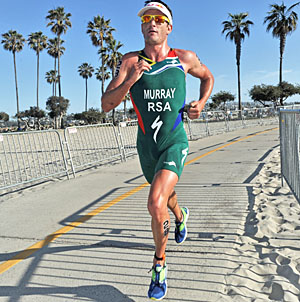
ST: How well might you do riding this mountain course here in Maui?
Richard: It has a lot to do with conditioning. I know the mountain here is pretty wild. When I rode it two days ago, I almost got heat stroke.
ST: What sections caught your interest?
Richard: There are some very technical sections uphill. And there was also no point where you can grab a water bottle. Which was worrying, because I wasn't going race pace. So, during the race I have to plan exactly where I get off the single track. We have bottle cages that pull put sideways so you don't have to pull them upwards. So you can pull it in, and smash it in the bike. Those little things are important. because if you don't drink at that time, it will catch you later in the race.
ST: What were your big wins on the ITU circuit?
Richard: Last season [2012] I got three World Triathlon Series podiums. It was it was my first time racing the WTS and I needed three podiums to qualify for the Olympics. I finally qualified in April.
ST: Where were those podiums?
Richard: The first race was in Sydney at the start of the season where I think I came second. I came third last year in San Diego and this year I was second. In 2012, I won at Hamburg where I beat Javier Gomez in a sprint. I was nervous so I went quite early and dropped him as I also have quite a bit of natural speed. My sprinting is not bad either. But over 5ks and 10ks, he has a little edge on me.
ST: I know you compete with everyone at the elite level now. But do you have some triathletes you look up to?
Richard: It is quite funny. Javier Gomez still is my idol even though I race against him and have beat him twice in sprint distance races. What matters in the end is what type of person you are. At the end of their career, people are going to look back at what type of person you are and not how many accolades you got.
ST: I think Javier Gomez is a prince of a fellow.
Richard: This is very true. What is nice is he is not doing it on purpose. He acts as he is. There are a lot of people who feel they have to act to make sure that their rep stays correct. But he is genuinely a nice person. He stops to talk to people on the street who asks him questions. I don't know how he's managed to pull the season he just did [WTS World Champion] because he raced all over the globe all the time. And last year here in Maui, he raced amazingly. So he is doing things correctly.
ST: You have a good swim – so you are probably pretty good in the surf?
Richard: I used to be terrible in the surf. But I got a new coach this season – Joel Filliol. He's done wonders for me and has changed my stroke quite a lot.. My stroke used to be very mechanical and when it was choppy I would die. Now I've changed it completely and now when it is choppy I am a happy boy.
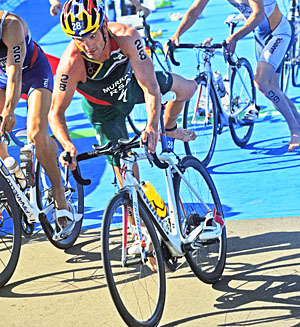
ST: Do you believe you can win?
Richard: I think I can win, yes. I think I can win anything. That's my mentality. Because if you don't think you can win, you won't. But for me this is fun, because if you put a lot of expectation on yourself and don’t get that, you fall apart. So I am all about doing the best I can and if it happens to bring me on the podium, then so be it.
ST: Maui is a nice place, succeed or fail.
Richard: Even if I fail, I'm on Maui. I come here on holiday. My girlfriend and my parents are here for 10 days.
ST: Who is your girlfriend?
Richard: Rachel Klamer. She is a European national champion from the Netherlands and she is very, very good.
ST: If you two set up a correct gender handicap, you would have a very back and forth season. Rule if thumb is men are somewhere around 10 or 11 percent faster on total time. You give her that, and the person who loses has to do the dishes.
Richard:That is what's happening this weekend in Australia. They have a handicap race – some 691 seconds. Rachel won that race last year coming up against Courtney Atkinson, who is racing here this weekend. I said that it would be fun to do that in an XTERRA race. The thing is, I believe it is too technical and you couldn’t possibly set a fair handicap in these races. It wouldn't work. But I said to the XTERRA folks yesterday they should have a compulsory 20-second stop at the top of the mountain on the bike course where you come in and you are allowed to look at the view and have a sip of your water bottle. And then they'd time you out again and you have to go. I think it would be interesting to make people stop and actually smell the roses. LAUGHS
Greg Welch at press conference: Richard you are very new to this sport. XTERRA started off for you in February this year in your home country. Tell us how nice it was to do an XTERRA, Secondly, how nice it was to have a win over Conrad Stoltz in South Africa.
Richard: I planned to do XTERRA at the start of my season to get some strength training and I thought XTERRA is a pretty good way to go about it. I went into the race with no expectation. People were saying 'Oh, he doesn't know what's going to happen.' I was going into it purely to have fun. It was quite a spectacular event. I was a little out of my depth on the bike and I was sure that Conrad and Dan [Hugo] were going to run me down. Halfway through the bike, I was still ahead of them. So there was a possible chance I could do well. Conrad came past me on a single track section and I was hanging on and following him, trying to hit his lines and everything. It was quite spectacular to see something like that.
ST: Did you know a win would qualify you for Maui?
Richard: It was going to be a long season and there was a good chance I would end up in a position I was happy with. But I won it [Stoltz was disqualified for going off course on the run] and I later found out I had actually qualified for Maui.
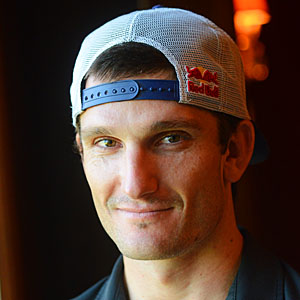
ST: When did you start to prepare for this race?
Richard: I started training for this in the Netherlands two weeks ago. It was very cold and rainy and very flat. So I had a couple of doubts in my mind how I was going to do because when I arrived and saw this place – you can see the ocean up here and it's warm and hilly.
Greg Welch: A bit of contrast from the Netherlands to Kapalua, Richard. Explain for us what it's like representing South Africa at the 2012 Olympics Games — sitting in a bunch of skinny freaks who don’t know how to ride their bikes — and compare it to this bunch of muscled guys who absolutely let it all hang out. Does that intimidate you at all?
Richard: Not a bit. I'm a bit of a wild character myself. Lot of people don’t know that the biking in ITU is very demanding. I've been racing all season and I've pushed every single race. Every race I am smashed by the time the run comes up. So I wouldn’t say it is similar to XTERRA. But I have to work extremely hard. So instead of having to put out a lot of watts on the bike, definitely the XTERRA guys have pushed me on the trails. I know that. But I am here to have some good fun. There is not much expectation. And it's been a long year and I am feeling pretty good and I am thinking I will have a good race.
ST: Tell us about your evolution riding the mountain bike?
Richard: I rode a motorcycle when I was 6 or 7 and I raced when I was a junior. I raced the mountain biking champs in South Africa when I was 14 and 15 and I was South African champ for two years when I was 16 and 17 years old. So I was contemplating mountain biking as a career when I was quite young. Then I moved into the slightly older category and there were a lot of big boys out there. At that time I decided to go to road cycling and I was also doing cross country running and things of that sort. I eventually started mixing in some duathlons and went to the world championship of duathlon when I was 18 or 19. And so I asked myself where do I go from here? People said triathlon is already one of the biggest sports, bigger than duathlon. So I had to learn to swim because ITU is very swim orientated – swimming and running. I've been working on my swim for the past four years. So yeah, I come actually from an off road background. and moved on to the road. I did a 70.3 at the beginning of this season as well but a couple of guys told me it wasn't a good idea to do long distance races so young. But yeah, my roots are in off road. I plan to come back to XTERRAs at the end of my ITU career.
ST: All triathlon is a closed energy equation. When you are on, you can run with Javier Gomez and anyone else in the sport of triathlon — on pavement. In that one XTERRA race you had against Conrad, how wasted were you at the end of the bike? And what percentage of your run did you have left after that rugged bike?
Richard: Maybe 15 or 20 percent. I was cramping 5ks into the bike. My hamstrings were not used to a full suspension bike. I have been riding a 26 inch fantail forever but they said 29 with full suspension is the way to go for XTERRA. My back and my legs weren't used to that type of seated position all the time on the bike, so it put a lot of strain on my hamstrings and my quads were shot. I had to control myself on the run because my legs were locking up and at one point of the run I could see Conrad and said to myself, 'Don’t cramp up! Don't cramp up! You won’t catch him.' Hopefully this time I will control myself a little bit more. I know the XTERRA guys will get away from me. But it's OK. It's gonna happen. And it's gonna be wild.


